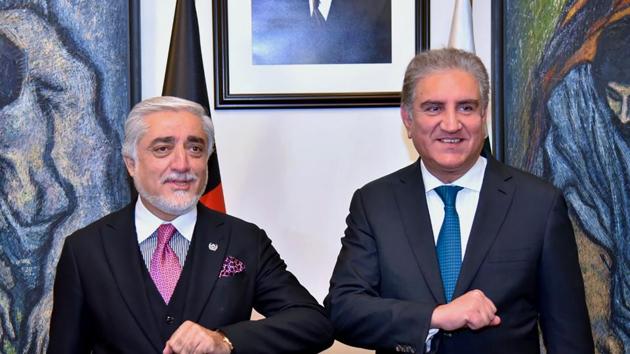Top Afghan negotiator in Taliban peace process holds talks in Pakistan
Abdullah Abdullah, who leads the Afghan High Council for National Reconciliation said he had a constructive meeting with Pakistan foreign minister Shah Mahmood Qureshi.
Abdullah Abdullah, Afghanistan’s top official in peace talks with the Taliban, met top officials in Pakistan on Monday as he began a three-day trip during which he will meet Prime Minister Imran Khan and the country’s military leadership.

The chairman of Afghan High Council for National Reconciliation was received by top government officials on arriving in Islamabad.
“We discussed the #PeaceProcess, the intra-Afghan talks in Doha, & strengthening bilateral relations,” he tweeted after a meeting with Pakistan foreign minister Shah Mahmood Qureshi.
In his meeting with Qureshi, Abdullah appreciated Pakistan’s efforts in taking the peace process ahead.
Quershi told the visiting delegation that Pakistan, as a shared responsibility, has been playing the role of facilitator in the Afghan peace process and that the US-Taliban peace agreement and later the intra-Afghan dialogue held in Doha have raised the prospects of durable peace in Afghanistan.
The Pakistani minister told the delegation that the Afghan leadership should seize this historic opportunity and undertake serious efforts to take the Afghan peace process to a logical conclusion.
“We will also have to keep an eye on the spoilers who do not want peace and stability in the region,” said Qureshi, adding “Pakistan desires dignified return of millions of Afghan refugees to their homeland.”
Abdullah is expected to meet with President Arif Alvi, army chief Gen Qamar Javed Bajwa, the speaker of the National Assembly and the chairman of the Senate.
He is accompanied by a high-level delegation including prominent members of the council.
A statement by the Pakistan foreign office said Abdullah will deliver a keynote address at the Institute of Strategic Studies Islamabad and interact with the media.
This is Abdullah’s first visit to Pakistan in his capacity as Chairman of the High Council for National Reconciliation. The visit will provide an opportunity for wide-ranging exchange of views on the Afghan peace process and strengthening of Pakistan-Afghanistan bilateral relations and people-to-people interaction, the ministry statement noted.
It said that Pakistan attaches high importance to its fraternal ties with Afghanistan, rooted deep in shared history, faith, culture, values and traditions. Pakistan fully supports all efforts for peace, stability and prosperity of the Afghan people. The visit of Abdullah will contribute to further strengthening amity, brotherhood and close cooperation between the two countries, it said.
The council represents the Afghan government in historic peace negotiations with the Taliban which began in Qatar on September 12. Those talks represent the most serious effort yet at ending decades of war in Afghanistan that followed the 2001 US-led invasion that toppled its Taliban government, which then hosting al Qaeda leader Osama bin Laden who planned the September 11 attacks.
The Afghan-Taliban talks come after a deal signed in February between the US and the Taliban. That deal aims to allow the US to withdraw from Afghanistan and end the longest military engagement in American history.
Many Taliban leaders have lived in Pakistan since the 1980s. In those years they were part of the Afghan mujahedeen, allies of the US in ending the 10-year occupation of the country by the Soviet Union.
Pakistan has denied giving sanctuary to Taliban members following their ouster in 2001. However, both Washington and Kabul routinely accuse Islamabad of giving them a safe haven, citing the Taliban long ties with Pakistan’s powerful Inter-Services Intelligence agency.
Khan publicly has said his government facilitated the talks. He said now it was now up to the Afghans to seize this opportunity.
Pakistan’s border areas in the northwest served as a base for the Pakistani Taliban and other militants until a few years ago, when the army said it cleared the region of insurgents. But occasional attacks have continued.
(With inputs from Agencies)



